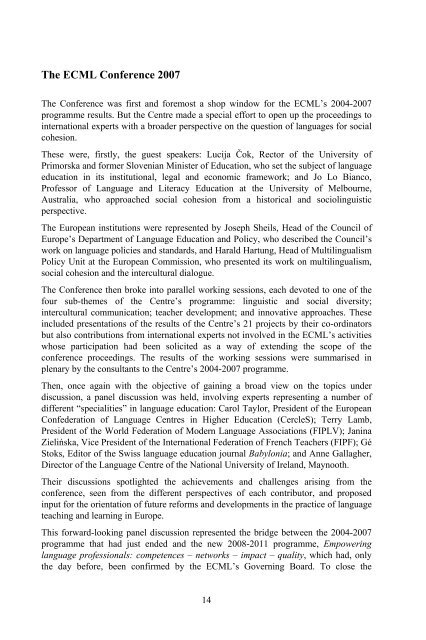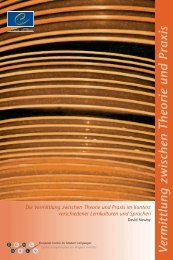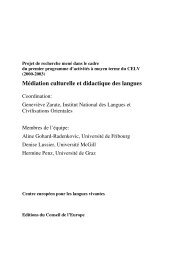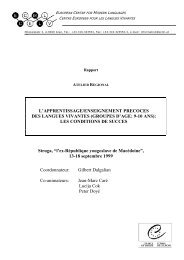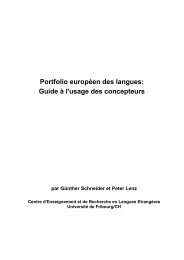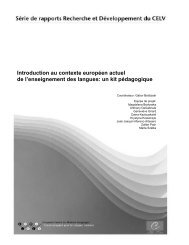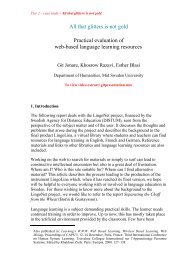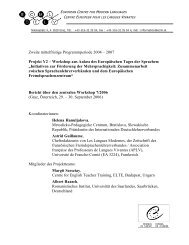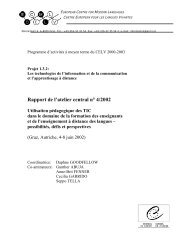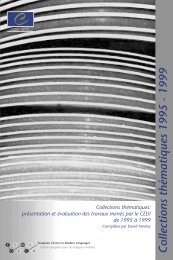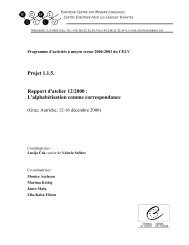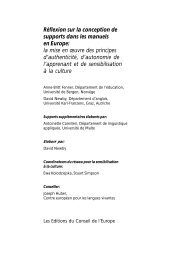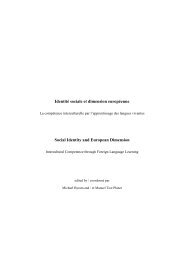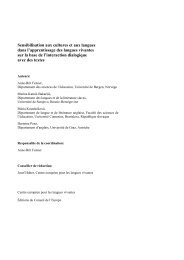cohesion - European Centre for Modern Languages
cohesion - European Centre for Modern Languages
cohesion - European Centre for Modern Languages
Create successful ePaper yourself
Turn your PDF publications into a flip-book with our unique Google optimized e-Paper software.
The ECML Conference 2007<br />
The Conference was first and <strong>for</strong>emost a shop window <strong>for</strong> the ECML’s 2004-2007<br />
programme results. But the <strong>Centre</strong> made a special ef<strong>for</strong>t to open up the proceedings to<br />
international experts with a broader perspective on the question of languages <strong>for</strong> social<br />
<strong>cohesion</strong>.<br />
These were, firstly, the guest speakers: Lucija Čok, Rector of the University of<br />
Primorska and <strong>for</strong>mer Slovenian Minister of Education, who set the subject of language<br />
education in its institutional, legal and economic framework; and Jo Lo Bianco,<br />
Professor of Language and Literacy Education at the University of Melbourne,<br />
Australia, who approached social <strong>cohesion</strong> from a historical and sociolinguistic<br />
perspective.<br />
The <strong>European</strong> institutions were represented by Joseph Sheils, Head of the Council of<br />
Europe’s Department of Language Education and Policy, who described the Council’s<br />
work on language policies and standards, and Harald Hartung, Head of Multilingualism<br />
Policy Unit at the <strong>European</strong> Commission, who presented its work on multilingualism,<br />
social <strong>cohesion</strong> and the intercultural dialogue.<br />
The Conference then broke into parallel working sessions, each devoted to one of the<br />
four sub-themes of the <strong>Centre</strong>’s programme: linguistic and social diversity;<br />
intercultural communication; teacher development; and innovative approaches. These<br />
included presentations of the results of the <strong>Centre</strong>’s 21 projects by their co-ordinators<br />
but also contributions from international experts not involved in the ECML’s activities<br />
whose participation had been solicited as a way of extending the scope of the<br />
conference proceedings. The results of the working sessions were summarised in<br />
plenary by the consultants to the <strong>Centre</strong>’s 2004-2007 programme.<br />
Then, once again with the objective of gaining a broad view on the topics under<br />
discussion, a panel discussion was held, involving experts representing a number of<br />
different “specialities” in language education: Carol Taylor, President of the <strong>European</strong><br />
Confederation of Language <strong>Centre</strong>s in Higher Education (CercleS); Terry Lamb,<br />
President of the World Federation of <strong>Modern</strong> Language Associations (FIPLV); Janina<br />
Zielińska, Vice President of the International Federation of French Teachers (FIPF); Gé<br />
Stoks, Editor of the Swiss language education journal Babylonia; and Anne Gallagher,<br />
Director of the Language <strong>Centre</strong> of the National University of Ireland, Maynooth.<br />
Their discussions spotlighted the achievements and challenges arising from the<br />
conference, seen from the different perspectives of each contributor, and proposed<br />
input <strong>for</strong> the orientation of future re<strong>for</strong>ms and developments in the practice of language<br />
teaching and learning in Europe.<br />
This <strong>for</strong>ward-looking panel discussion represented the bridge between the 2004-2007<br />
programme that had just ended and the new 2008-2011 programme, Empowering<br />
language professionals: competences – networks – impact – quality, which had, only<br />
the day be<strong>for</strong>e, been confirmed by the ECML’s Governing Board. To close the<br />
14


